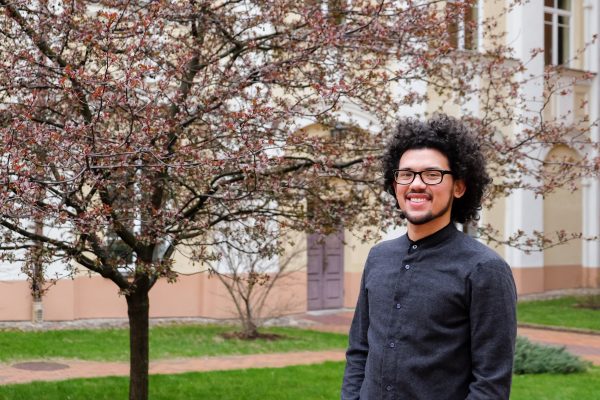
David Cuadra
IIRPS VU Bachelors student of political science
What was your way to Lithuania? Why did you decide to come here and what was the easiest or the most difficult about making this decision?
I travelled to Lithuania in July 2018. My wife is Lithuanian and we came to visit her family. Our plan was to stay in the country for a couple of months only. Unfortunately, as my country, Nicaragua, was going through a political unrest that started in April 2018, and continued until the middle of 2019, we decided that the best thing to do would be to stay in Lithuania. We moved to Vilnius, got a dog and settled down here. Even though this was not planed, and we made this decision given the circumstances, the process we had to go through was not difficult at all and I personally felt very welcomed by the Lithuanian community.
Tell us a bit more about your life in Nicaragua. What was your daily routine there and how does it differ from your life in Lithuania?
The main difference between my country and Lithuania without any doubts is the weather. Nicaragua is a very hot country and I had never experienced winter before. I did not mind it much at the beginning and enjoyed seeing the snow for the first time. But not seeing the sun for 3 or 4 months was my biggest challenge. Also, just before coming to Lithuania I was teaching art through a local NGO in a small beach town in Nicaragua. So, here in Lithuania the roles changed as I became a student again.
What did you find the most fascinating or surprising about Lithuania? Maybe there was something challenging?
There were two most fascinating things for me about Lithuania. The amount of trees that you can find everywhere and Lithuania’s pagan cultural roots. I guess those two things are somehow connected. Nicaragua may have volcanoes, jungle and beaches, but we do not have anything compared to the Lithuanian forests. I felt in love with that. I incorporated daily walks in the forest to my routine. Also, as my personal passion is drawing and painting, I started to add more trees to my artwork. I guess this new environment truly inspired and influenced me. Regarding the pagan culture I just fell in love with the different symbols, stories, traditions, rituals and artworks that I saw in all the places I visited.
I noticed that you describe yourself as a “self-taught artist”, you are also working in a design company “Art on Wall”. Why did you decide to choose political science? How do you combine art and politics?
Art was not something I meant to do as a profession. I use art as a tool to express my ideas in a way that words cannot. However, when I came to Lithuania, my art knowledge was helpful for me to organize art seminars, workshops and participate in festivals to share my artwork with the community.
My university studies in Nicaragua were in Political Science. I was just two semesters away from graduating from Diplomacy and Political Science at the National Autonomous University of Nicaragua (UNAN in Spanish). Unfortunately, in my country studying politics can be complicated. It is my opinion that the party in power in the current Nicaraguan government gets too involved in university affairs, especially if these are public universities. Therefore, I made the decision in 2016 to take an academic break and participate in community volunteering programs in rural areas of Nicaragua. However, due to the political unrest that was affecting my country, I decided to continue my studies in Political Science here in Lithuania. Once I return to Nicaragua, I hope to participate more actively in the political affairs of my country using the knowledge and skills I’m gaining at Vilnius University.
What do you think about your studies experience in IIRPS VU? Is there any advice that you could give for the fellow students?
My experience here in IIRPS VU has been very positive and fruitful. I have learned more than I expected, and my world vision has truly broadened. My advice to my fellow students is never to stop participating and raising their voices inside and outside a classroom. The academic setting is a safe place to share your perspectives, have them challenged by the classmates and teachers, and in this way get prepared for the real-world scenarios.







